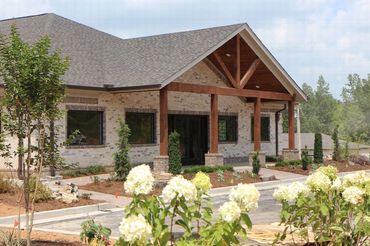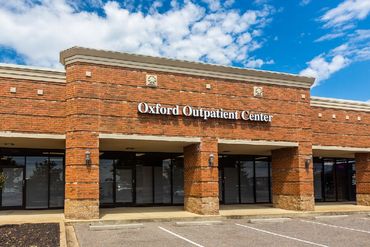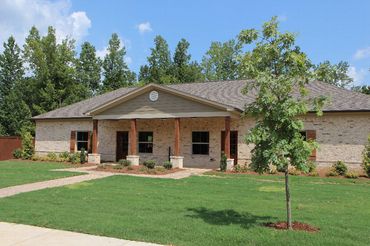
Drug & Alcohol Rehab Centers near Union County, MS
Are you or a loved one struggling with drug or alcohol addiction in Union County, Mississippi? If so, Rehabs.com is an excellent resource that provide the guidance you need to locate the help you need. You’ll find numerous drug and alcohol rehabs in the area that can get you or your loved one on the path toward sobriety. Use Rehabs.com to search for a facility that offers addiction treatment and rehab in Union County. Browse both outpatient and inpatient alcohol and drug treatment facilities to find the best rehab center that’s the right fit for you or your loved one.
Treatment Centers near Union County, MS

All Treatment Centers near Union County, MS
- Jackson Rehabs
- Hattiesburg Rehabs
- Oxford Rehabs
- Meridian Rehabs
- Southaven Rehabs
- Corinth Rehabs
- Greenwood Rehabs
- Ridgeland Rehabs
- Raleigh Rehabs
- Gautier Rehabs
Information About Rehab in Union County
Inpatient vs Outpatient
Outpatient and Inpatient
An inpatient rehab treatment center is when you live at the center for the duration of treatment. Residential rehab treatment is best for those who don’t have a supportive home environment in which to recover. With inpatient drug rehab centers, you’ll receive therapy and care during the day from a number of seasoned medical professionals. At inpatient alcohol rehab centers, you may also receive medical detox services to monitor your withdrawal from alcohol.
For those with a network of loved ones willing to provide a safe and caring environment, outpatient rehab centers may be a better choice. With outpatient drug rehab centers, you’ll live at home and attend treatment during the day at the center. Outpatient alcohol rehab centers work the same way.
What is the Difference?
You may be wondering, what is the real difference when comparing inpatient vs outpatient care? Inpatient care, also called residential care, offers 24/7 assistance and is generally separated into short- and long-term variants. Long-term inpatient rehab may last 6 to 12 months, while short-term inpatient rehab is generally 3 to 6 weeks.4 Because of the extent of care involved, it’s typically more expensive than outpatient treatment.
Another difference between inpatient and outpatient treatment is the limitations on your freedom. With outpatient care, you may be able to maintain a job and social life. Because you aren’t living in a community in outpatient care, it also heavily features group therapy to compensate for this lack of community.4
Latest Reviews
Latest Reviews of Rehabs in Mississippi
Harbor House Chemical Dependency Services
I felt like there was a lot of support in the program that kept me straight. I wish i still had that type of support I wish they would hav kept in touch with me They really tought me a lot about the 12 steps, which I think will always be a part of my battle to stay clean and sober
JourneyPure - Southaven
Knowledgeable dedicated staff. Good co-occurring and trauma screening and treatment. Needs larger space with Detox availability
More Info
Union County, Mississippi Substance Abuse Statistics
Those living in Union County, Mississippi deal with a fair share of drug and alcohol abuse. In Mississippi Region 1, of which Union County is a part, it’s estimated that 9.01% of the population used an illicit drug during the past month between 2016 and 2018.1 Additionally, 19.59% reported binge alcohol use in the past month during the same timeframe.1
Drug Abuse in Union County, Mississippi
In Union County, Mississippi, 2 of the most commonly abused drugs are cocaine and prescription drugs. About 1.56% of the Region 1 population used cocaine between 2016 and 2018.1 An additional 4.50% of Region 1 misused pain relievers during the same period.1 Prescription drugs are the most commonly abused substances among children 12 to 13 years old, likely because they have access to them in the home.2
Luckily, heroin is not as big a problem as it is in the rest of the country. Only 0.23% of the Region 1 population abused the drug, compared to 0.26% in the rest of the South and 0.33% across the nation.1,3
Alcohol Abuse in Union County, Mississippi
Alcohol abuse is another big problem in Union County, Mississippi. In Region 1, 36.10% of the population used alcohol in the last month, while 19.59% reported binge alcohol use.1 There are not just high rates of drinking among adults, either. An estimated 14.95% of 12-20 year olds used alcohol in the past month, while 8.26% of this age group reported binge alcohol use.1
Unfortunately, an estimated 4.14% of those who had an alcohol use disorder (AUD) in Region 1 required but did not receive treatment.1
30 Day Programming
When it comes to inpatient treatment programs, a 30-day drug rehab or 30-day alcohol rehab program has you live at the treatment facility (anywhere between 28-20 days). While you are in treatment, you will attend individual and group therapy sessions, participate in 12-step or other support group meetings, and learn relapse prevention techniques to help you remain sober once you return home.
Thirty-day drug rehab programs can be a good beginning point for those who are struggling with drug or alcohol addiction. While it may feel overwhelming to commit to a long period of treatment, 30 days may feel short enough that patients are more willing to commit to rehab. In addition, a 30-day treatment program gives patients the time they need to go through detox and begin to address the underlying issues that contributed to their substance abuse. This allows them to being living a sober lifestyle that they can continue working on after the complete treatment.
90 Day Programming
Ninety-day treatment programs include intake and evaluation, detox, therapy, self-help groups, and aftercare. A 90-day drug rehab or 90-day alcohol rehab program may provide patients with the time they need to learn and develop habits and strategies that they can use as they pursue recovery after treatment. It can take time to develop habits and learn skills, and 90-day treatment programs may provide the needed time a safe and supportive environment.
Long-term treatment programs are also a good option for those who have a long-standing substance abuse issue, have relapsed, or feel that they need more time to work on the skills they need to support their recovery.
How to Find the Best Rehab Facility Near Me
Searching for best-rated rehab centers near you? One key tip is to use reviews and feedback. This can tell you what people thought of their experience there and if it helped them maintain sobriety.
Another important thing to consider when looking for top-rated rehab centers near you is if the center offers a full range of care. Some alcohol or drug rehab programs only focus on one or two issues. Because substance abuse is often a complicated issue, you should look for rehabs in Mississippi that:
- Treat mental health disorders.
- Are specifically tailored to treat the substances being abused.
- Do not rely on high-risk strategies for withdrawal and detox, including rapid detox.
- Address issues beyond detox. They should also focus on the lifestyle and emotional and psychological factors that have contributed to the substance use disorder (SUD).
- Focus on treating specific groups, including women, veterans, LGBTQ, and those with co-occurring disorders.
How to Find Dual Diagnosis Rehab Centers In Union County
A dual diagnosis rehab center can treat both a mental illness and substance abuse at the same time. For many people, these two conditions are intertwined, so treating them both at once may offer better outcomes.5 As an example, a dual diagnosis rehab center may treat both substance abuse and depression or substance abuse and anxiety at the same time.
If you’re looking for a dual diagnosis rehab center in Union County, Oxford Treatment Center is an excellent choice. It can help you with depression, anxiety, substance abuse, and other mental health conditions so you can improve all aspects of your mental and emotional health.
How to Pay
Although addiction treatment can be very expensive, there are various ways to pay for treatment. Many people pay for alcohol and drug rehab with private insurance. However, there are other options that may help you obtain the treatment you are looking for, including grants, scholarships, sliding pay scales, and payment plans. There are also state and federally run facilities that can provide treatment. Don’t let the fear of the price of rehab stop you from pursuing the care, support, and treatment that you need.
Medicaid Coverage
Medicaid is the largest healthcare insurance program in the country.6 It is a joint federal and state program that provides free or low-cost insurance coverage to low-income applicants who are:7
- 65 or older.
- 19 or younger.
- Pregnant.
- Disabled.
- Caring for a child.
The Affordable Care Act (ACA) expanded eligibility for Medicaid coverage to include other groups and income levels, depending on your state.
Medicaid does typically cover drug and alcohol rehab treatment. Medicaid rehab coverage may vary depending on a person’s particular insurance plan. The costs associated with substance abuse and addiction treatment may vary between Medicaid health insurance members by state
Medicare typically covers the cost of alcohol and drug addiction treatment, but coverage may vary depending on your individual insurance plan. In addition, costs associated with addiction rehab may vary based on the state of residence for the Medicaid insurance member.
Insurance Coverage
The Affordable Care Act (ACA), passed in 2010, requires that all health insurance providers must provide coverage for addiction treatment services. Insurance plans must provide coverage for mental health services, including addiction treatment.
Depending on your state and your health plan, specific behavioral health benefits may vary. Insurance companies cover part or all of the costs of rehabilitation, so coverage may vary.
Getting Care Without Insurance
There are low-cost, and even free, treatment programs for those who do not have insurance. Many states provide funding for rehab services that can be accessed by those with no insurance or income. There are also scholarships that may be available at individual treatment facilities. Some facilities may be open to establishing a payment plan that allows you to pay off your treatment over time. In addition, there are certain organizations that provide assistance to those who have no insurance but are seeking alcohol or drug addiction rehab.
Not having insurance does not mean you cannot obtain treatment for substance abuse.
What is Treatment for?
Alcohol or drug addiction may involve the misuse of various substances. When patients look for help, they may be pursuing:
There are treatment facilities in Dallas County and beyond that provide treatment for various drug addictions.
Cities in Union County, Mississippi
- Blue Springs
- Myrtle
- New Albany
- Sherman
If you’re struggling with substance abuse in Union County, Mississippi, you have resources available for help. Choose a drug or alcohol rehab center to help you get back on your feet and begin on the path to recovery.
Sources
- Substance Abuse and Mental Health Services Administration. (2020). 2016-2018 NSDUH Substate Region Estimates: Mississippi.
- Mississippi State Department of Health. (2019). Preventing Opioid and Prescription Drug Abuse.
- Substance Abuse and Mental Health Services Administration. (2019). Behavioral Health Barometer: Mississippi, Volume 5: Indicators as measured through the 2017 National Survey on Drug Use and Health and the National Survey of Substance Abuse Treatment Services.
- National Institute on Drug Abuse. (2018). Principles of Drug Addiction Treatment: A Research-Based Guide (Third Edition): Types of Treatment Programs.
- National Alliance on Mental Illness. (2016). Substance Use Disorders.
- Medicare.gov. (n.d.). What’s Medicare?




